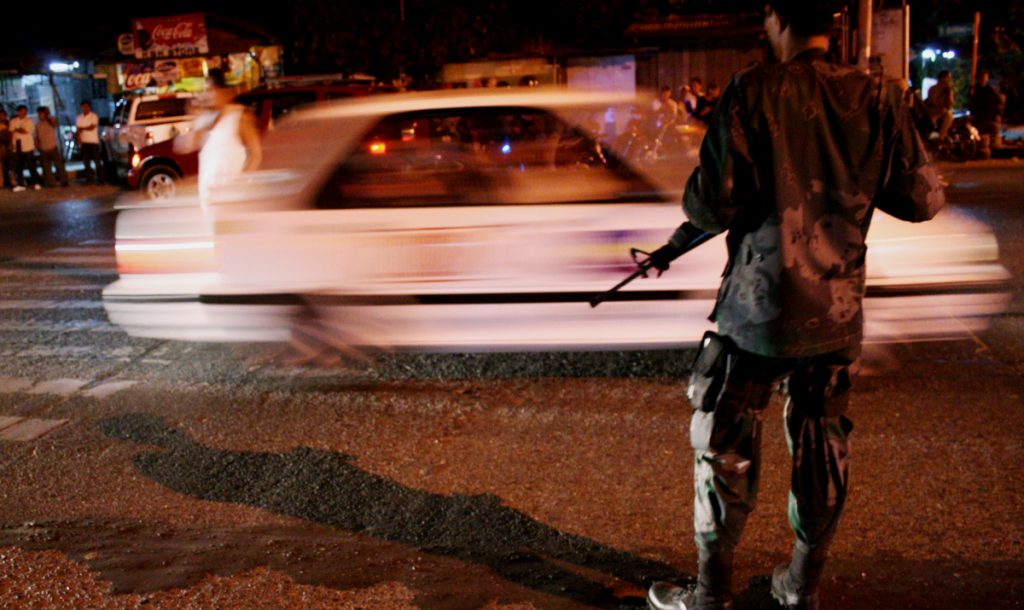Local apathy towards surging killings stems from an ingrained culture of violence in the nation’s politics.
Philippines President Rodrigo Duterte’s bloody war on drugs has racked up more than 2,000 deaths in two months, as well as widespread shock and condemnation worldwide. But less so in the Philippines, where the purge is condoned, if not tacitly supported, by most societal and political groups.
A widespread apathy drowns out the disapprovals of segments of the Filipino liberal media, civil society, and Catholic Church. This apathy bewilders many in the West but needs to be understood in the paradoxical relationship Filipinos have developed with violence.
Violence permeates politics in the Philippines, and this goes beyond the ripple effects of Ferdinand Marcos’s dictatorship. Violence remains an integral part of how politics is contested, especially in the provinces of the country.
The 2009 Maguindanao massacre, in which a rival political faction killed 58 people, was the most brutal manifestation of political violence to date, but only a symptom of a larger malaise.
One of the root causes is the private armies that most regional politicians have. Beyond rhetorical calls to get rid of them, these have been institutionalised through the mutually beneficial relations that bind dynastic families contesting for political power in Manila and their allies in the provinces.
The violence that ensues has been normalised in the psyche of the country and its people. At least 50 people, or an average of nearly one person every two days, were killed in the lead-up to May’s presidential elections. Most Filipinos did not bat an eyelid.
Violence is rampant in the Philippines. It is palpable when walking in some neighbourhoods of Manila. It is ubiquitous in some parts of the country where an Islamic and a Maoist insurgency have been simmering for over three decades. And it is tangible in the easy access to weapons throughout the archipelago.
When in the Muslim-Christian divided city of Zamboanga City, in the southernmost part of the archipelago, a few years back, witnessing Church goers casually put away their guns before serving coffee in their house left me a little more than uneasy. “Everyone has a weapon here; it is normal,” was their answer to my inquisitive look.
Violence also structures society. Poverty is deep-rooted in a system that sees extreme wealth and poverty rubbing shoulders. The pro-market policies of former President Benigno Aquino improved macroeconomic indicators but benefited the elite.
During his six-year term, the net worth of the top 40 families in the country tripled while the percentage of the people living below the poverty line did not move from about 26 per cent.
Moreover, while the Philippines has a set of laws that make it among the most gender-fair in the world, domestic violence remains pervasive in the country and hushed under the mantle of machismo and the indifference of the police. The security apparatus is also trigger happy, corrupt, only partly accountable and easily politicised.
It is worth remembering that the current ‘war on drugs’ is not an isolated case of state-sanctioned extra judicial killings. In the early 2000s former President Gloria Macapagal Arroyo authorised the military, and its proxies, to eliminate the support base of the National Democratic Front, the legal umbrella organisation for the Maoist insurgency. At least 1,200 left-wing sympathisers, including activists and journalist, were killed. The world rightly condemned the killings. Meanwhile, most Filipinos went on with their lives.
Of course, Filipinos do not like violence. Indeed, they are extremely tired of it. But paradoxically, the way in which violence has historically been ingrained in the crevices of Filipino society means that they are prone to accept violent means to contain violence. Duterte, as obnoxious and vulgar as it may be perceived in the West, is the product of such a paradox — he is not its cause.
Duterte has been remarkably consistent with his electoral promises, and that is why he currently enjoys huge levels of popular support. A recent survey in the Philippines gave him a support rate greater than 90 per cent. This Kim Jong-un esque approval equals a green light for more killings.
And the support base for Duterte seems to span across the class spectrum. Many among the well-educated, middle-class Filipinos tolerate Duterte’s approach, although they are coy to be seen to do so.
Two of them have sheepishly told this writer that former leaders, including Aquino and Arroyo, had promised to curtail the everyday violence that plights the country, but had achieved little. Duterte’s approach, they whisper, may just produce the jolt the country needs.
Their logic embodies how the paradox perpetuates itself and feeds Duterte. We may sneer at Filipinos, but we also need to understand them and their circumstances.
Fabio Scarpello is a research fellow at the Asia Research Centre, Murdoch University.
This article is a collaboration between New Mandala, a specialist website on Southeast Asia’s politics and societies based at the ANU Coral Bell School of Asia Pacific Affairs, and The Myanmar Times.
 Facebook
Facebook  Twitter
Twitter  Soundcloud
Soundcloud  Youtube
Youtube  Rss
Rss 